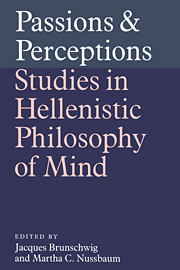Book contents
- Frontmatter
- Contents
- Preface
- Avant-propos
- Part I ETHICS AND PSYCHOLOGY OF HEDONISM
- Part II ATOMISM AND EPICUREAN PSYCHOLOGY
- Part III THE PASSIONS
- Part IV STOIC PSYCHOLOGICAL CONCEPTS
- Chapter 8 De la ‘nature phantastique’ des animaux chez les Stoïciens
- Chapter 9 Le concept de doxa des Stoïciens à Philon d'Alexandrie: essai d'étude diachronique
- Chapter 10 Seneca on reason, rules, and moral development
- Chapter 11 Chrysippus on psychophysical causality
- Bibliography
- Subject index
- Name index
- Index of passages cited
Chapter 11 - Chrysippus on psychophysical causality
Published online by Cambridge University Press: 22 September 2009
- Frontmatter
- Contents
- Preface
- Avant-propos
- Part I ETHICS AND PSYCHOLOGY OF HEDONISM
- Part II ATOMISM AND EPICUREAN PSYCHOLOGY
- Part III THE PASSIONS
- Part IV STOIC PSYCHOLOGICAL CONCEPTS
- Chapter 8 De la ‘nature phantastique’ des animaux chez les Stoïciens
- Chapter 9 Le concept de doxa des Stoïciens à Philon d'Alexandrie: essai d'étude diachronique
- Chapter 10 Seneca on reason, rules, and moral development
- Chapter 11 Chrysippus on psychophysical causality
- Bibliography
- Subject index
- Name index
- Index of passages cited
Summary
INTRODUCTION
This chapter will in effect be an extended commentary on a single passage, Cicero, de Fato 7–9, which indirectly attributes to Chrysippus a strong thesis of psychophysical causality. I shall hope to show what that thesis amounts to, and how it fits into the teleological structure of the Stoic causal nexus. At the same time, I shall be offering reasons for seeing the Stoic theory in question as largely a development of Platonic psychology.
This last point needs some qualification. Chrysippus himself was openly opposed to at least one feature of Plato's psychology, namely the tripartition of the soul, as expounded in the Republic, Phaedrus and Timaeus. But equally, he was sympathetic to, and almost certainly deeply influenced by, the more ‘Socratic’ psychology to be found elsewhere in Plato's dialogues – the monistic theory presupposed in the Protagoras, developed in the Phaedo, and arguably still observed in the Theaetetus – according to which the soul is in itself a purely intellectual faculty. Given the further fact that Socrates, unlike Plato, was from the start revered as an absolute authority by the Stoics, it is probably most correct to locate the background to Stoic psychology not in Platonic but in Socratic psychology. At the same time, it would be misleading to imply that any ancient reader of Plato operated with an entirely clearcut distinction between historically Socratic texts on the one hand and Platonic texts on the other.
- Type
- Chapter
- Information
- Passions and PerceptionsStudies in Hellenistic Philosophy of Mind, pp. 313 - 331Publisher: Cambridge University PressPrint publication year: 1993



